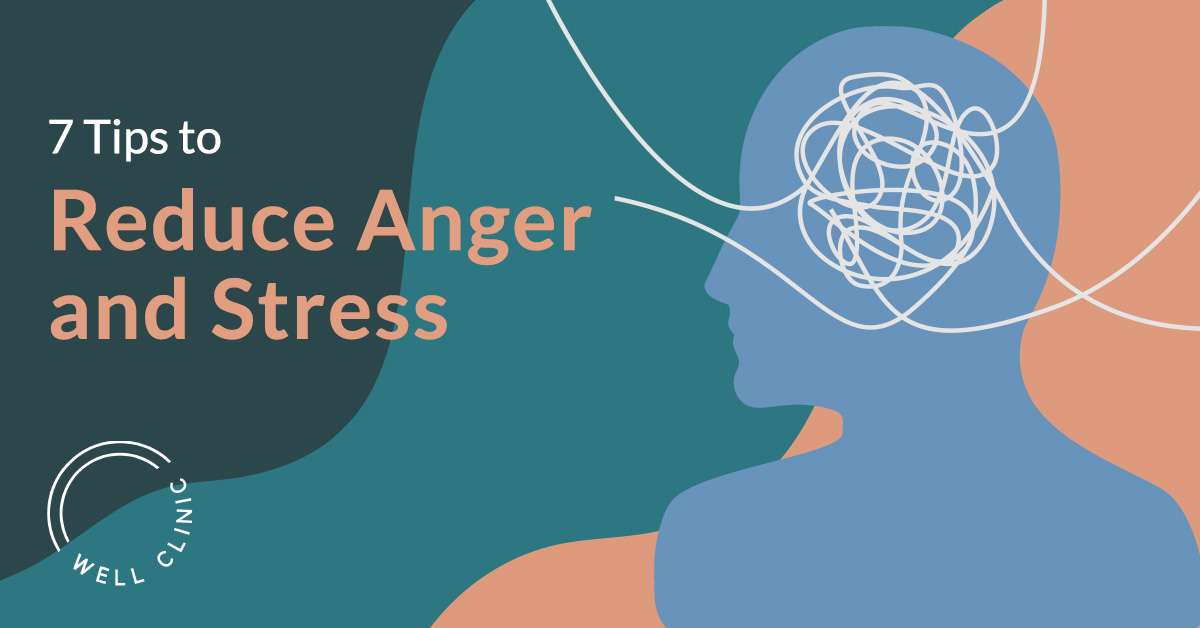Anger is a natural response. It is neither good nor bad on its own. However, an inability to manage anger can cause immense stress in your life.
That stress can, in turn, cause countless health and relational problems. Learning to work with your anger can ease that stress.
3 Key Benefits of Anger Management
Anger management stress relief helps you put anger in its proper place. It helps you learn three core things:
1. How to Minimize Unhelpful Anger
Anger can be helpful to us. It can point to areas of our life where we need change. However, constant, pervasive, irrational anger isn’t helpful. You can learn the difference. Moreover, you can eliminate the unnecessary anger which reduces stress.
2. Control Anger When You Can
Anger management stress relief shows you different ways that you can control anger. You don’t have to allow your frustration to overwhelm you. You can feel angry and yet have no angry outbursts or other anger issues.
3. Express Your Anger in Healthy Ways
Most importantly, anger management stress relief shows you how to express your anger in healthy ways. When anger is unhealthy it manifests as passive aggressive behavior or even outright aggressive behavior. You can express your anger in ways that are positive, helpful, and move you forward. You can express anger without harming yourself or others.

Anger Leads to Stress
Before we get into our tips for how to reduce anger and stress, let’s look at the relationship between the two. Anger is an emotion. It’s an emotion that many people find uncomfortable. Moreover, it’s an emotion that we haven’t been taught well how to deal with in the United States.
Therefore, people tend to have one of two extreme approaches:
- Some people try to stuff down their anger. It bottles up inside.
- Other people let their anger loose, through verbal and or physical outbursts.
Both methods lead to stress. This happens at a physical level. Anger ignites your fight-or-flight response. Your body releases adrenaline and cortisol. These are stress hormones.
You literally feel stress in your body when you are angry. This manifests as physical symptoms such as increased heart rate, higher blood pressure, and changes in breathing.
People with unhealthy anger over a long term period of time can experience numerous health problems including headaches, digestion problems, heart attack, and stroke. Excess anger is also correlated with mental health issues including anxiety and insomnia.

7 Tips to Reduce Anger and Stress
Anger problems also cause issues in relationships be it at work, with friends and family, or even with strangers. Angry outbursts alienate others. This stresses those relationships, which further stresses your mental and physical health.
In contrast, if you reduce anger, then you can deal with frustrations in healthier ways. You can communicate more effectively with others.
Here are seven tips to reduce anger and stress:
1. Practice Deep Breathing
Slow, deep breaths help alleviate the stress in your body. As you breathe, you calm that fight-or-flight response. Any time that you begin to feel angry, pause and take five slow, long, deep breaths. Inhale and exhale as slowly as you can. Imagine the anger leaving your body with each exhale.
2. Learn Mindfulness Techniques
Mindfulness simply means that you notice what is happening in the moment, without judgment. If you can notice your anger trigger then pause and practice mindfulness, you can circumvent your angry reaction. One effective technique is to identify what you see, smell, hear, taste, and can touch right in this moment. As you do that, the anger dissipates. The more mindfully present you are, the better you can handle any stressful situation.
3. Get Enough Physical Activity
One of the ways to counteract that fight-or-flight response is to get physical. Don’t wait until anger builds up to do this. Instead, make physical activity a regular part of your day. Walking, running, bicycling, swimming, dancing, and yoga are all terrific movement options.
4. Repeat a Positive Word or Phrase
Come up with a word or phrase that you can use as a mantra when you notice that you are acting angry. For example, remind yourself, “everything is okay in this moment” or “I can let this go for now.” You might even just remind yourself “relax” or “chill out” or “take it easy.”
You might even share the phrase with your closest friends and family members, so that they can remind you of it when they experience your anger. This isn’t a way to ignore that you are angry. Instead, it’s a way to calm down in the moment and gain perspective so that you can deal with your anger from a healthy place.
5. Count Backwards from 100
If you feel particularly angry, count backwards by 3s or 7s. Focusing your brain on this type of task helps alleviate the anger.
6. Take a Mental Vacation
Go to your happy place. Close your eyes. Let everything around you melt away. Spend a few minutes imagining your favorite place in the world. Picture every aspect of being in that place. Relax. Let the anger melt away.
7. Prioritize Self-Care
Are you sleeping well? Eating right? Living a healthy work-life balance? Have you done some of your favorite hobbies recently or had a call with a favorite relative? The better you take care of yourself on a daily basis, the easier it is to be your best self.

Anger Management Therapy Supports You
Anger management stress relief is something that you can learn to do on your own. However, it helps a lot to get support from a mental health professional.
Anger management counseling can help you identify your anger triggers, separate out reasonable anger from irrational or unhelpful anger, learn how to reduce anger in your day-to-day life, and teach you skills to express your anger in healthy, helpful ways. Reach out to us today to speak with one of our anger management therapists.
Anger management: 10 tips to tame your temper
Keeping your temper in check can be challenging. Use simple anger management tips — from taking a timeout to using “I” statements — to stay in control.
By Mayo Clinic Staff
Do you fume when someone cuts you off in traffic? Does your blood pressure rocket when your child refuses to cooperate? Anger is a common and even healthy emotion. But it’s important to deal with it in a positive way. Uncontrolled anger can take a toll on both your health and your relationships.
Ready to get your anger under control? Start by considering these 10 anger management tips.
1. Think before you speak
In the heat of the moment, it’s easy to say something you’ll later regret. Take a few moments to collect your thoughts before saying anything. Also allow others involved in the situation to do the same.
2. Once you’re calm, express your concerns
As soon as you’re thinking clearly, express your frustration in an assertive but nonconfrontational way. State your concerns and needs clearly and directly, without hurting others or trying to control them.
3. Get some exercise
Physical activity can help reduce stress that can cause you to become angry. If you feel your anger escalating, go for a brisk walk or run. Or spend some time doing other enjoyable physical activities.
4. Take a timeout
Timeouts aren’t just for kids. Give yourself short breaks during times of the day that tend to be stressful. A few moments of quiet time might help you feel better prepared to handle what’s ahead without getting irritated or angry.
5. Identify possible solutions
Instead of focusing on what made you mad, work on resolving the issue at hand. Does your child’s messy room make you upset? Close the door. Is your partner late for dinner every night? Schedule meals later in the evening. Or agree to eat on your own a few times a week. Also, understand that some things are simply out of your control. Try to be realistic about what you can and cannot change. Remind yourself that anger won’t fix anything and might only make it worse.
6. Stick with ‘I’ statements
Criticizing or placing blame might only increase tension. Instead, use “I” statements to describe the problem. Be respectful and specific. For example, say, “I’m upset that you left the table without offering to help with the dishes” instead of “You never do any housework.”
7. Don’t hold a grudge
Forgiveness is a powerful tool. If you allow anger and other negative feelings to crowd out positive feelings, you might find yourself swallowed up by your own bitterness or sense of injustice. Forgiving someone who angered you might help you both learn from the situation and strengthen your relationship.
8. Use humor to release tension
Lightening up can help diffuse tension. Use humor to help you face what’s making you angry and, possibly, any unrealistic expectations you have for how things should go. Avoid sarcasm, though — it can hurt feelings and make things worse.
9. Practice relaxation skills
When your temper flares, put relaxation skills to work. Practice deep-breathing exercises, imagine a relaxing scene, or repeat a calming word or phrase, such as “Take it easy.” You might also listen to music, write in a journal or do a few yoga poses — whatever it takes to encourage relaxation.
10. Know when to seek help
Learning to control anger can be a challenge at times. Seek help for anger issues if your anger seems out of control, causes you to do things you regret or hurts those around you.
There is a problem with information submitted for this request. Review/update the information highlighted below and resubmit the form.
From Mayo Clinic to your inbox
Sign up for free, and stay up to date on research advancements, health tips and current health topics, like COVID-19, plus expertise on managing health.
ErrorEmail field is required
ErrorInclude a valid email address
To provide you with the most relevant and helpful information, and understand which information is beneficial, we may combine your email and website usage information with other information we have about you. If you are a Mayo Clinic patient, this could include protected health information. If we combine this information with your protected health information, we will treat all of that information as protected health information and will only use or disclose that information as set forth in our notice of privacy practices. You may opt-out of email communications at any time by clicking on the unsubscribe link in the e-mail.
Thank you for subscribing!
You’ll soon start receiving the latest Mayo Clinic health information you requested in your inbox.
Sorry something went wrong with your subscription
Please, try again in a couple of minutes
- Kassinove H, et al. Happiness. In: The Practitioner’s Guide to Anger Management: Customizable Interventions, Treatments, and Tools for Clients With Problem Anger. Kindle edition. New Harbinger Publications; 2019. Accessed March 11, 2022.
- Understanding anger: How psychologists help with anger problems. American Psychological Association. https://www.apa.org/topics/anger/understanding. Accessed March 11, 2022.
- Controlling anger before it controls you. American Psychological Association. https://www.apa.org/topics/anger/control. Accessed March 11, 2022.
- Tips for survivors: Coping with anger after a disaster or other traumatic event. Substance Abuse and Mental Health Services Administration. https://store.samhsa.gov/product/tips-survivors-coping-anger-after-disaster-or-other-traumatic-event/pep19-01-01-002. Accessed March 11, 2022.
- Caring for your mental health. National Institute of Mental Health. https://www.nimh.nih.gov/health/topics/caring-for-your-mental-health. Accessed March 11, 2022.
See more In-depth



